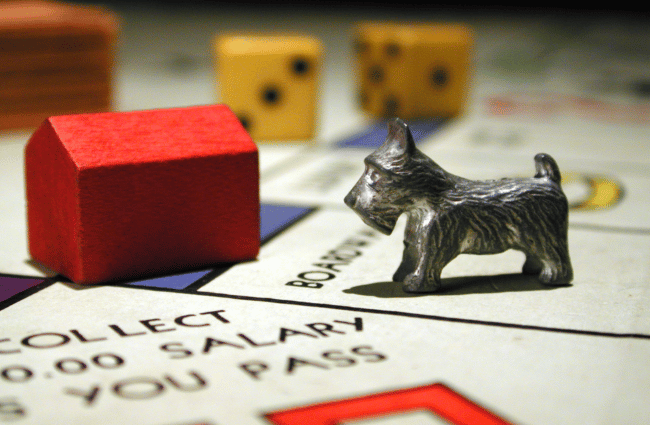The New Monopoly Game Token
So what explains the continuing popularity of Monopoly today, nearly eighty years after its introduction? One reason for the popularity of Monopoly is the random nature of the game. No two games play out exactly the same way because of random dice rolls and the element of luck. Another reason for its popularity is its simplicity. While younger players may require assistance with some of the math and money handling, the premise of the game remains simple: acquire more wealth than your opponents through the acquisition of wealth-producing properties. A third reason for Monopoly’s popularity is the interactive negotiation among players that occurs during game play. And finally, for most people the game of Monopoly provides the earliest introduction to financial concepts that they will use throughout life. Let’s examine some of these financial concepts and principles, and how they relate to real-life.

Risk & Reward are Related
The game of Monopoly isn’t won by players who hoard cash. Monopoly is won by players who take risks by purchasing properties and then developing these properties with houses and hotels in the hopes of receiving higher rents (the rewards) from players who land on their properties. In real-life, you cannot hope to quickly accumulate wealth by settling for the low rate of returns offered by banks. You have to accept some level of risk with your investments (typically by investing in equities) to earn a reasonable rate of return when hoping to achieve your long-term financial goals (retirement, children’s education, financial independence, etc.).
Diversification is Important
In the game of Monopoly it is imperative to own and develop at least one color group to generate significant income to help you win the game. But players have a higher chance of success when they augment a color group with railroads and/or utilities that will also generate additional income. Players can also improve their chances for success by owning key properties of other color groups to prevent other players from developing color groupings that work against them. The blend of different properties reduces the player’s risk and improves the odds of winning.
In real-life, we know that creating well-diversified investment portfolios by combining different asset classes together also reduces investors’ risk, and improves investment returns over time. By owning different asset classes that don’t react in synchrony to market conditions, investors can avoid extreme peaks and valleys in market situations by reducing overall portfolio risk and earning more consistent investment returns.
Cash Management & Liquidity
In Monopoly, players face a challenging balancing act. In order to achieve long-term success, players must spend cash to acquire properties and develop color groupings to generate the income necessary to win the game. On the other hand, players must retain enough cash to pay the penalties, taxes and rents to other players that they incur as they traverse the board. In real-life, investors are advised to create a cash reserve sufficient to withstand three to six month of living expenses in case they encounter unexpected job loss or significant expenditures. Maintaining these cash reserves often conflict with investors’ long-term financial goals like retirement and providing college education for their children.
Understanding Return on Investment
Each property and property grouping in Monopoly has a different expected return on investment. According to Philip Orbanes, who is the chief judge at the World Monopoly championships and author of “Monopoly, Money and You,” the orange and red properties offer superior expected investment returns while the expected returns for the green properties are dreadful. Expected return factors include initial cost, cost of development, how frequently player land on the space, and rent earned per level of development.
But it is not always the properties with the highest expected return that win the game. Orbanes notes in his book that the player from Norway won the world championship in 2009 with the humble light blue property group, the 2004 championship was won with the modest purple property group, and the 1979 championship was won with high-priced deep blue properties Park Place and Boardwalk.
In real-life, stocks have higher expected returns, over time, than either bonds or cash. In every investor’s lifetime, however, there are times and economic conditions, where bonds or cash will significantly outperform stocks. (Another argument for diversification!) And within each major asset class (stocks, bonds, cash), there are sub-classes that exhibit their own unique risk and return characteristics. For example, small cap stocks are more volatile than large cap stocks, but historically offer slightly higher returns than large cap stocks. Stocks in emerging market regions are more volatile than more-developed international regions, but can reward patient investors with higher returns. These characteristics are why younger investors own more equity (stock) assets than fixed income (bonds) and why the mix changes as investors more closely approach their financial goals.
As you endure these final weeks of winter waiting for spring and warmer temperatures, perhaps you will pull out your Monopoly game for an exciting game with family or friends. As you play, recall the lifelong financial lessons Monopoly teaches you, and incorporate them into your own financial planning activities.

